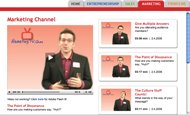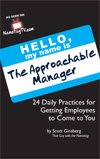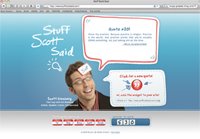 Who’s in hot pursuit of you?
Who’s in hot pursuit of you?
Professionally, that is. I don’t want this to turn into another episode of Cops.
Anyway, if the answer is, “Not enough people,” consider these six strategies for becoming a more pursuable professional:
1. Be beautiful to listen to. Consider the last five vendors you’ve hired. Or the last five colleagues you’ve partnered with. Hell, even consider the last five people you’ve dated. Question: How many of those individuals were a pain in the ass just to LISTEN to?
Every interaction you have with somebody either adds to or subtracts from the positive perception of your brand. What’s more, the pursuit of a potential person – business or personal – is either exacerbated or enhanced by the way you feel when interacting with that person.
Remember: When you’re music to people’s ears, you’re a magnet to people’s wallets. Would YOU be compelled to listen to you?
2. Learn from the daters. “Pursue” is a common term used in the dating world. So, I’ve collected a myriad of journal, blog and message board quotations from various single people. As you explore this list, consider the implications of each “non-pursuable” to your own business:
a. I didn’t pursue because I assumed he was out of my reach. Are you perceived as being out of your customer’s league?
b. I didn’t pursue because I assumed he didn’t like me. What false assumptions are your customers making about you?
c. I didn’t pursue because I didn’t feel confident enough to go after him. How are you increasing customer self-confidence?
d. I didn’t pursue because I was scared of the potential of failure. How could you remove the threat of rejection for your customers?
e. I didn’t pursue because I was resolute in the belief that I wasn’t better than anyone else. How might you increase your customer’s self-esteem?
f. I didn’t pursue because I saw him kissing some random girl in a bar. Are you overly engaged with your current customers to take on anybody new?
g. I didn’t pursue because I was worried he was going to tell his mom. Are your customers concerned about confidentiality?
Remember: Business and dating is EXACTLY the same thing. You still have customers. You still need to look attractive in their eyes. You still have to keep them satisfied and coming back for more. And still need to make yourself more pursuable to future prospects. Whom are YOU dating?
3. Become the physical embodiment of your expertise. It’s one thing to know something; it’s another thing to BE that something. And if you want to be pursued in greater numbers, your expertise must become crystallized through the sieve of experience – PLUS – intelligent reflection upon that experience.
That’s certainly the type of person I’d pursue. Someone who doesn’t know (x), but who IS (x). See the difference? Embodiment secures trust. Embodiment reinforces character. And embodiment promotes pursuit. Are you acquiring knowledge or do you possess REAL wisdom?
4. Figure out what’s missing for people. If you build it – and they DON’T come – it’s because they don’t want it. Or because they don’t know you built it. Or because you didn’t solve their problem. Or because you’re passionate yet irrelevant – cool but inconsequential.
Here’s the secret: People who get pursued are the ones who UNDO what the customer has done to himself. But they’re not jerks about it. They just strategically position themselves based around what they were designed to cure. And as a result, prospects are hot on their trails. What problem are you the answer to?
5. Learn from the lawyers. In the legal world, “pursuable” is also a term traditionally designated to cases and complaints that have a positive chance of succeeding. And the best lawyers are the ones who pinpoint pursuability immediately, so as not to waste anybody’s time.
Interestingly, when I researched the term “non-pursuable,” I found a collection of cases from a variety of industries. Each of them predicted non-pursuability in some fashion. So, as you read each of these, consider the applications to your own career:
a. The case was non-pursuable because they passed the statute of limitations. Has the clock run out on your brand’s market relevance?
b. The case was non-pursuable because the charge wasn’t significant enough. Do you matter?
c. The case was non-pursuable because they didn’t meet the case criteria. What is your credibility strengthening process?
d. The case was non-pursuable because the complainant didn’t provide further information. Are you leaving people hanging?
e. The case was non-pursuable because the proposal effort was unwarranted in light of the likelihood of rejection. Are you known for saying no reflexively?
a. The case was non-pursuable because the accused was incarcerated. Have you actually left the house today, or are you still in your jammies?
b. The case was non-pursuable because they were unable to contact the company. How many different ways can customers reach out to you?
c. The case was non-pursuable because insufficient evidence was collected. If you were charged with the crime of delivering value, would there be enough evidence to convict you?
d. The case was non-pursuable because they lacked substantiation. Are you proving value?
e. The case was non-pursuable because the assailant was never identified. Do you have a good working model of your brand identity?
Remember: Lawyers know what they’re doing. Most of the time. OK, some of the time. Alright, fine, lawyers are evil and they should burn in the fiery pits of hell for all of eternity. But the point is, they ask better questions than anyone. Listen to them. They’re the masters at determining pursuability. Have you had lunch with your attorney lately?
6. Let your customers help you sell them things. People train you how to treat them. Customers tell you how to sell them. All YOU have to do is listen. Now, I’m not talking about any of that manipulative NLP mirroring/matching/pacing crap. I’m talking about leveraging the natural rhythms of your customers.
Pinpointing their passions, preferences and personalities – then using those patterns to stop selling and start enabling to buy. Because all buyers know what they want. ALL of them. You just need to listen. After all, what YOU sell isn’t the same thing as what THEY buy. Know the difference. How are you giving customers permission to make your business better?
REMEMBER: As much as you’d like to – you can’t MAKE people pursue you. You can, however, transform yourself into a more pursuable person.
LET ME ASK YA THIS…
Whatcha gonna do when they come for you?
LET ME SUGGEST THIS…
For the list called, “12 Ways to Out Service the Competition,” send an email to me, and you win the list for free!
* * * *
Scott Ginsberg
That Guy with the Nametag
Author, Speaker, Coach, Entrepreneur
[email protected]
 Never the same speech twice.
Never the same speech twice.
Always about approachability.
Watch The Nametag Guy in action here!

 1. Look first at what you’re not facing.. “When our lives are not working, there is always at least one thing we’re not facing,” wrote Gay Hendricks in Conscious Living, “and looking away from what you need to face burns more energy than actually facing it.”
1. Look first at what you’re not facing.. “When our lives are not working, there is always at least one thing we’re not facing,” wrote Gay Hendricks in Conscious Living, “and looking away from what you need to face burns more energy than actually facing it.”  1. Attention without conversion is narcissism. Attention for the sake of attention feeds your ego. Attention for the sake of conversion – that is, building a following through your permission asset so your movement (not product) can make people’s lives better – feeds your wallet. The choice is yours.
1. Attention without conversion is narcissism. Attention for the sake of attention feeds your ego. Attention for the sake of conversion – that is, building a following through your permission asset so your movement (not product) can make people’s lives better – feeds your wallet. The choice is yours. 
 1. Attitude is the best asset. Especially in a down economy. My challenge to you is to approach recessions as opportunities to renew resourcefulness. By blaming the economy you evade responsibility and continue to NOT taking action. Instead, believe that greatness is near.
1. Attitude is the best asset. Especially in a down economy. My challenge to you is to approach recessions as opportunities to renew resourcefulness. By blaming the economy you evade responsibility and continue to NOT taking action. Instead, believe that greatness is near.
 1. Learn how your work affects the bottom line. People want money, sex and happiness. Period. Take away all that Maslow’s Hierarchy crap, and that’s what you’re left with. Especially within an organization.
1. Learn how your work affects the bottom line. People want money, sex and happiness. Period. Take away all that Maslow’s Hierarchy crap, and that’s what you’re left with. Especially within an organization. 1. Insecurity is the great inhibitor. Insecurities are growth opportunities. “I don’t care how self-aware you get – there’s always more to learn,” says my coach
1. Insecurity is the great inhibitor. Insecurities are growth opportunities. “I don’t care how self-aware you get – there’s always more to learn,” says my coach  1. Brainstorming is the great time-waster. You don’t need another meeting. You don’t need another conference call. And you don’t need to spend another afternoon talking the life out of your idea. You need to take massive action. Today.
1. Brainstorming is the great time-waster. You don’t need another meeting. You don’t need another conference call. And you don’t need to spend another afternoon talking the life out of your idea. You need to take massive action. Today. 
 1. Prepare yourself to be promotable. First, shift from an attitude of need to an attitude of want. It’s healthier, more attractive and good practice surrendering. Second, acknowledge your own value. If you don’t, nobody else will. Third, exercise a high degree of conscious control in creating the career you want.
1. Prepare yourself to be promotable. First, shift from an attitude of need to an attitude of want. It’s healthier, more attractive and good practice surrendering. Second, acknowledge your own value. If you don’t, nobody else will. Third, exercise a high degree of conscious control in creating the career you want.  1. Abundance of competition indicates unoriginality. If you’re truly unique, the only one who does what you do – the WAY that you do it – then no second-rate, chump-ass imitation should be able to hurt you. Screw the competition. Just because they’re there doesn’t mean you can’t beat them. What do you do that brings people back for more of YOU?
1. Abundance of competition indicates unoriginality. If you’re truly unique, the only one who does what you do – the WAY that you do it – then no second-rate, chump-ass imitation should be able to hurt you. Screw the competition. Just because they’re there doesn’t mean you can’t beat them. What do you do that brings people back for more of YOU? Who’s quoting YOU?
Who’s quoting YOU? 1. Behavior is the broadcaster of attitude. Don’t bother announcing to people what kind of attitude you strive to maintain. Anyone who’s even (somewhat) perceptive can already tell. And here’s why: Bodies override mouths, verbs outweigh nouns and actions embody mindsets.
1. Behavior is the broadcaster of attitude. Don’t bother announcing to people what kind of attitude you strive to maintain. Anyone who’s even (somewhat) perceptive can already tell. And here’s why: Bodies override mouths, verbs outweigh nouns and actions embody mindsets.